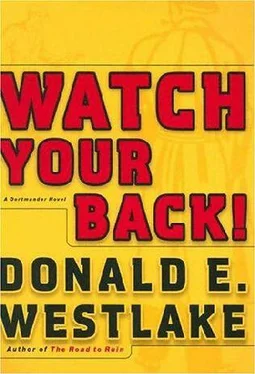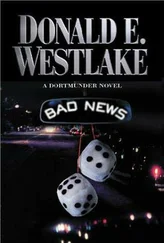Yes, there was the garage door, and there was the alarm he'd fixed. From what little they'd told him, and from what more he'd guessed, their object was the penthouse atop the corner building, and this garage would lead to a special elevator up to it.
Were they in there now? Or maybe they hadn't gotten here yet. Of course, if they'd already come and gone, then there was no point in his being here. But if it was such a big thing they were doing, it wouldn't be over by lunchtime, would it? In any case, he couldn't get here before now, because he didn't have a cover story to give J. C.
The point of what he'd done to the alarm system was to make it possible for them to unlock the garage door and then open it whenever they wanted to. Was it still unlocked? Had they been here? Were they here now? Had they not yet arrived? Judson took a quick look left and right, saw no one paying him any particular attention, tugged on the door, and it lifted.
Oh. Should he do this?
Too late; he was doing it. He pulled the bottom of the door up to waist height, slipped in underneath, and pushed it down again.
The place was empty. That's where the car would usually stand; you could see ghost tire treads on the dusty floor, but it was gone now. And there was still nobody around.
There were no windows in here, but an overhead light had come on when he'd opened the door, and by it he saw what had to be the door to the elevator. He went over there, pulled on that door handle, and another light went on, this one inside the elevator, which was right here.
Should he take it? He was in here now; there was nobody around; the penthouse up there was guaranteed to be empty, so why not?
Stepping into the elevator, he pressed the Top button and felt a moment of uneasiness as the elevator slid upward. But there was nobody around; there was nothing to worry about. Up there, he should be able to tell if the others had been through already or not. If they had, he'd just leave. If not, he'd wait for them, surprise them when they arrived, tell them he was just here to help carry stuff. If he was already in, they wouldn't throw him out, would they?
The elevator slowed, and stopped. Judson waited for the door to open, but it didn't, so he finally realized he'd have to push it open himself. As he did so (although he didn't know this), the elevator at the front of the penthouse was just closing on the last of the police as they vacated the crime scene.
Judson walked through the place, admiring the furniture, the carpets, the view. The living room was fantastic.
But it was also very empty. The walls were dotted with hooks where paintings once had hung. Pedestals stood around with nothing on top of them.
The gang had been here. They were so efficient, they'd walked right in and cleaned out everything they wanted and gone away again, and all before lunch.
They don't have to know I was here, Judson assured himself. I don't want to be some pest hanging around, like some little kid yelling, "Wait for meee!" So I'll just leave, and they'll never know I was here. But those guys are good, aren't they?
Walking back down the hall, he noticed they hadn't taken any of the few pictures hanging along here. They'd only taken things from the living room and dining room, probably figuring this stuff back here was less important.
One of the pictures attracted his attention, though it was kind of dark and small, less than a foot wide and maybe eight inches high. But for its size, it had a lot of detail. It was kind of medieval, with two guys his own age, in peasant clothes, and they were carrying a pig hung on a long pole, each of the guys having an end of the pole on his shoulder. They were walking on a path on a hillside with woods around them, and down the hill you could see what looked like a lake, with a few very rustic houses and wagons beside it, and a few people chopping wood and stuff like that.
What drew Judson's eye to this picture was the expressions on the two young guys' faces. They had, like, goofy grins on, as though they were getting away with something and couldn't help laughing about it.
Judson looked at the guys and their mischievous eyes and goofy grins, and he felt a kinship. He'd be one of those two, if he had lived then.
And all at once he got it: they'd stolen the pig.
Judson took the picture down off its hook on the wall, and studied it more closely. It was old, all right, done when those clothes were what you wore. It was painted on wood, and it was signed in the lower right with a signature he couldn't figure out.
The painting was in an elaborate gilded frame that didn't seem right for those two guys. There was also a sheet of non-reflective glass. Once Judson removed the picture from the frame, it wasn't heavy. It wasn't big. He liked it. He slid it under his shirt, tucked into the front of his pants, and headed for the elevator.
BY THE TIME they got back to Arnie's place, he was a nervous wreck in a completely different way. At first, when he'd rushed from Fareweather's garage with Dortmunder and Tiny, Arnie had been convinced Fareweather was no more than six feet behind him, probably still in his jammies, coming on like the avenging angel, whistling up cops right and left. When Dortmunder, constantly looking back because Arnie was too scared to, assured him over and over that no one matching Preston Fareweather's description was anywhere on the sidewalk back there, nor were there any cops, nor was there anything that looked remotely like pursuit of any kind, it didn't matter. Arnie, jiggling and jabbering like a marionette with electrified springs, just kept rushing forward, ahead of Dortmunder and Tiny, barely ahead of the imaginary hounds.
Then he was too scared to take a taxi, because the cabbie would write on his trip sheet what neighborhood he'd picked Arnie up in and would be able to testify against him at the inevitable trial before the inevitable incarceration of poor Arnie Albright, who should never, ever have been in that place in the first place, and where could he go now that the law was waiting for him at home?
"They're not waiting for you at home, Arnie," Dortmunder told him. "You'll go home, if somebody ever comes around, you say, that wasn't me, I don't know what the guy's talking about, search my place if you want."
"Ooohh."
"All right, you'll clean out a couple things. I'll come to your place with you, I know I'm partly responsible for you being—"
"Partly!"
"Well, Preston Fareweather has to take some of the burden, too, you know. Come on, Arnie, I'll come with you."
"I won't," Tiny said. "Good-bye." And he walked off down Madison, headed for lunch with J. C.
"Here we go, Arnie," Dortmunder said, "here's a nice cab—"
"No cabs!"
So it wound up, Arnie did walk through Central Park that day, though not in the cool of the morning but in the absolute heat and glare of the midday sun, like something in Lawrence of Arabia. Arnie didn't so much walk across the park, though, as hop from tree shade to tree shade and, where there were no trees, scuttle on like something you might see when you switch on the kitchen light.
Eventually they did traverse the park, and some of the West Side as well, and reached Annie's building, in front of which there were no official presences. Arnie scrambled up into the vestibule, followed by Dortmunder, but then, instead of unlocking the door he rang his own bell.
Dortmunder said, "Arnie? You're not home, we know that."
"But is somebody else?" Arnie said darkly, and stared at the intercom until it became obvious even to him that it wasn't going to say anything. Only then did he unlock the door and lead the way up to his apartment, where he looked around, grabbed his head with both hands in tragic despair, and cried, "How do I clean this place for the cops? You think I got receipts?"
Читать дальше












